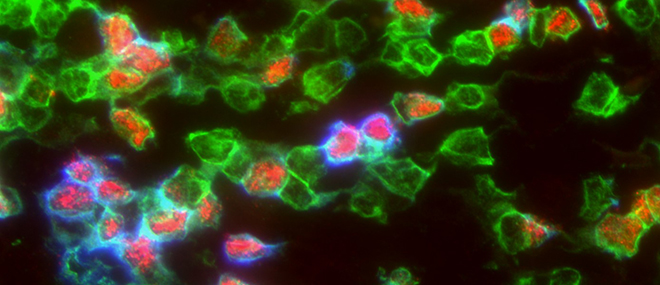About the Group
The main interest is mucosal immunology, inflammation and neoplastic development. We have previously worked with immunological aspects of inflammatory bowel disease (ulcerative colitis, Mb Crohn), celiac disease, astma and nasal polyposis. We are currently concentrating on oral conditions as celiac disease associated enamel defects, oral lichen planus and oral squamous cell carcinomas.
We recently published that untreated celiac children have increase serum IgA (and to a lesser extent, IgG) antibodies to Amelogenin that included anti-gliadin antibodies that cross reacted to amelogenin due to sequence homology. Amelogenin is very important during tooth development and defects in its structure or function may lead to enamel defects. We have further determined the IgA-B-cell epitopes on Amelogenin by using over lapping peptides and are currently working on its functional implication.
We previously observed an increase in regulatory T cells in Oral Lichen Planus (cand. Odont. Margaret Koren, 2008) and have further examined expression of different T-reg associated inhibitory molecules (cand. Odont. Åshild Høva: master 2012: “Increased density of T-regs in Oral Lichen Planus»; Cand. Odont. Salma Taha: “Examination of T-reg associated molecules by RT-PCR in Oral Lichen Planus», master 2012)
We are now working on the various dendritic cell compartment building on Margaret Koren original observation that there is an increase in Plasmacytoid dendritic cells (PDC) in OLP (2004).
We have been interested in some aspects of oral squamous cell carcinomas. From EGFR induced COX2 expression and PGE2 production in OSCC cell lines (Camilla Husvik, Ph.D. disputation 2009), through particular examination on how OSCC becomes Cisplatin resistance and the prognostic implication for expression of EGFR ligands (Jian Gao, Ph.D. disputation 2017) and prognostic factors and SOX2 expression in OSCC (Cecilie Attramadal Ph.D. disputation 2018)
We have further examined expression of transcription factors known to be involved in epithelial to mesenchymal transition (EMT; cand. odont. Unai Mangal master 2018). We are currently examining the intracellular mechanisms that controls EMT in OSCC, including the expression of microRNA, mRNA and transcription factors in sorted OSCC sub-lines.
